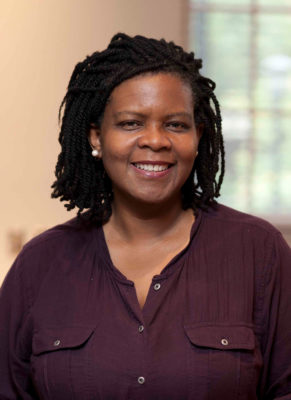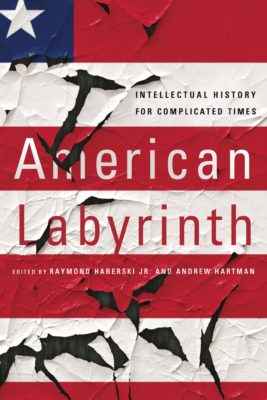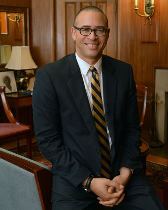
Annette Gordon-Reed
At the 2017 S-USIH conference in Dallas, after the wonderful plenary by Annette Gordon-Reed, in the Q&A session I infamously asked—after a preface wherein I thanked her for retelling the story behind her research and work on the Hemings family—something like the following:
Do you have anything special you would like to say to this particular group of intellectual historians?
There was a pause as Gordon-Reed pondered my question. As she reflected, a few of my colleagues, seated nearby, snickered. They thought I had asked the proverbial, adult beverage-induced dumb question. I realize now that I neglected, in asking, to emphasize a few key terms: namely, special and intellectual.
Anyway, after her pause, Gordon-Reed answered that no, there was nothing more. The story she wanted us to know was what she had told. The themes were, as I recall and internalized them, were as follows: follow your sources, trust your instincts, be courageous in the face work by past historians (i.e., those who didn’t follow your path), and do justice by your historical actors. I’m sure there were other lessons, which my colleagues can add in the comments. But those were what impressed me in November of 2017.
And my colleagues—God love them all—continued to rib me for a bit afterwards. We all had imbibed a few beverages, after a long day of intellectual engagement. As such, they wanted either a bit more from me, or for me to rest in the value of what had been presented. They had a point. It is not often that scholar of Gordon-Reed’s stature and prominence had addressed an S-USIH conference. She is part of the pantheon of living historians who have instant recognition across the profession.
The problem, in that moment, was me. I simply that I wanted more. It is to her credit, and the credit of numerous other scholars who have covered questions of race and historical recognition, that I had already absorbed those lessons. Of course they need to be reinforced, remembered, and put to use. For those reasons alone, repetition is necessary. Yet the problem was me.
I was in a place, at the conference, where I wanted more. Gordon-Reed’s evergreen plenary address—one that will remain a perennial lesson for all historians—simply didn’t touch on the deeper questions of methodology and philosophy that I needed. After the tumult of the preceding few years, with the election of the current white supremacist president, questions about police killings and acquittals, the rise of #BlackLivesMatter since 2013, and the example of Colin Kaepernick, I needed more tools, theories, and ideas to think about the current moment. I needed a deeper dive into something along the lines of Critical Race Theory, or at least something that on more present-day problems, ideas, and questions.

Published in 2018.
On the present, for me, enter Jonathan Holloway. As I’ve outlined here (and here) already, the essays in American Labyrinth (full disclosure: I am contributor) have spoken to me in many registers. I confess that I did not, however, expect any of the essays to resonate on questions of race. But they have.
My first reading of Holloway’s essay, titled “The Price of Recognition: Race and the Making of the Modern University” (pp. 71-85), was a distracted one. I recently reviewed my notes and his brief intervention resonated more than I realized. As a university worker (or “professional,” as I’m classified), I needed some tools to think about how African Americans are both recognized and forgotten as members of higher ed, whether as laborers, students, intellectuals, or otherwise.
Holloway argues that “exploring the world of ideas and its interactions with a social history of black bodies—intellectuals, students, workers—immersed in (historically white) college cultures invites an assessment about the costs associated with recognition. …”Black ideas,” for want of a better term, regarding recognition–the lack of it and the moment of its emergence–turn, almost inevitably, toward literal and figurative violence” (p. 71).
First, the intellectuals. Holloway discusses forgotten black thinkers (those whose “contributions simply didn’t register”), such as Eldridge Cleaver, Audre Lorde, James Baldwin, Ta-Nehisi Coates, Claudia Rankine, and Ralph Ellison (p. 72-75). The intellectuals and scholars who failed to recognize them missed the fact that “a radical break…had taken place in the secret parts of this nation’s soul” (p. 73). Black intellectuals registered the fact that “critical discourse was about survival,” and was “a vital necessity of [their] existence” (p. 73). In the discussion of Baldwin, the topic of white consciousness and recognition. “Admiration,” Holloway reflects, “could feel like an acknowledgment for those bestowing the recognition, but admiration did not do anything to address the structural problems that were part…of an unacknowledged existence in the first place.” Holloway concludes the section thus:
This work and pain [for black intellectuals], both grounded in invisibility that is, in truth, the failure to recognize someone as fully human (or is a perverse hypervisibility that prevents careful and critical analysis because it suggests a person is superhuman) and both related related to the psychological violence that springs from the fact the “black idea” can be so easily dismissed, is not unique to the black scholar and the professional maker of ideas. (p. 75)
I needed to hear these points about recognition and critical discourse to understand how and why absences continue. This helps go to questions on my mind about the long-term productivity of intellectual life in relation to past black thinkers. Why have they not been heard, in the deepest sense? What has prevented whites from listening?
Second, the students. In this section, Holloway reflects on former Yale student Armstead Robinson and the process of “deculturation,” as well as hypervisibility and the “dirty fights” of racism on campus (p. 76, 77). As a Mizzou alum (meaning this author), Holloway’s choice to ponder the actions of Jonathan Butler was poignant. Butler engaged in a hunger strike in 2015 to force the administration’s hand on several issues. In this Butler called on the recognition of past Black students’ efforts at Mizzou who had called for change (rather than letting current administrators claim credit for “new” initiatives (p. 78). Turning to Yale, where Holloway worked, he lamented the real anger and resentment that students experienced when they felt they had been used as “window dressing” in relation to deeper structural racism in the institution (p. 79).
Third, workers. Here Holloway does some interesting historical labor, focusing on university service workers. Again at Yale, the story turns to Corey Menafee—the black dining hall worker who resented the “bucolic” etched glass images of slaves in the Calhoun College dining hall. The Menafee episode put a spotlight on racial inequalities among service workers, as well as the history of minorities in higher ed service work, at Yale and beyond (pp. 80-83).

Jonathan Holloway
As remarkable as the American Labyrinth essay is, I enjoyed, and appreciated more, Holloway’s 2018 S-USIH Annual Conference Plenary address. Titled “Currency: Race and the Circulation of the American Ideal,” the address speaks to black bodies buried and on display, via a particularly famous headstone (of John Jack), a coins, and an iteration of the American passport. I won’t recount the whole address. What impressed me was how Holloway wove larger ideas and phrases, useful for encapsulating problems in African American history and Black intellectual history. Using Ellison’s “Optic White” metaphor to propose an American Optic Ideal regarding circulation and propagation of black bodies, he branches into discussions of the “routinization of erasure,” hypocrisies, blindnesses, bad faith, whitewashing, and coverups by white America. These things happen even as white America commemorates and celebrates particular visions of figures like John Jack, Booker T. Washington, George Washington Carver, Martin Luther King, Jr., and Anna Julia Cooper.
Holloway provided me with some ideas and language to reframe recent historical events. I feel a bit better equipped in facing some of my day work (as a higher ed administrator) and my side hustles as an intellectual historian and history instructor. Those arenas draw from American intellectual history as it has played out over the past 50-70 years—the post-WWII period and beyond. Maybe that, in fact, was the ultimate source of my unfulfilled desire with Gordon-Reed: simple chronological relevance?
In the vein of recognition, I suppose this post consists of three parts: (1) an apology, of sorts, to Annette Gordon Reed; (2) a note of gratitude to Jonathan Holloway; and (3) some deep thinking with his scholarship. I appreciate the work of both thinkers, and their engagement with S-USIH—even when my needs have circumstantially favored one over the other. And hopefully this post makes up for my infamous poorly worded question in Dallas. At the very least, it’s helped me understand why my ribs hurt, metaphorically, for a while after the snickers. – TL

4 Thoughts on this Post
S-USIH Comment Policy
We ask that those who participate in the discussions generated in the Comments section do so with the same decorum as they would in any other academic setting or context. Since the USIH bloggers write under our real names, we would prefer that our commenters also identify themselves by their real name. As our primary goal is to stimulate and engage in fruitful and productive discussion, ad hominem attacks (personal or professional), unnecessary insults, and/or mean-spiritedness have no place in the USIH Blog’s Comments section. Therefore, we reserve the right to remove any comments that contain any of the above and/or are not intended to further the discussion of the topic of the post. We welcome suggestions for corrections to any of our posts. As the official blog of the Society of US Intellectual History, we hope to foster a diverse community of scholars and readers who engage with one another in discussions of US intellectual history, broadly understood.
“Holloway discusses forgotten Black thinkers (those whose “contributions simply didn’t register”), such as Eldridge Cleaver, Audre Lorde, James Baldwin, Ta-Nehisi Coates, Claudia Rankine, and Ralph Ellison (p. 72-75)…. I needed to hear these points about recognition and critical discourse to understand how and why absences continue. This helps go to questions on my mind about the long-term productivity of intellectual life in relation to past Black thinkers. Why have they not been heard, in the deepest sense? What has prevented whites from listening?”
I haven’t read Holloway’s essay. But there’s a critical difference between a group of thinkers being “forgotten” relative to those thinkers “not being heard, in the deepest sense.” It could be due to milieu, but when I read the first sentence quoted above, I immediately militated against the idea that any of those six Black thinkers listed has been “forgotten,” in any significant sense. Coates and Baldwin, especially, have had a very good couple of years, if measured in nothing other than press coverage and awards. But the other four have also maintained their presence in the mainstream media, little magazines, blogs, and academia.
Might it not make more sense to discuss more deeply how the work of the six Black thinkers mentioned (and so many other not-forgotten-but-not-deeply-heard Black intellectuals) has been subject not to erasure, per se, but to “hypocrisies, blindnesses, bad faith, whitewashing, and coverups by white America” — and, particularly, well-meaning white liberal critics and journalists and readers?
Josh: You’re right. That was a poor word choice. I was trying to convey, per Holloway, that some of their most important *ideas* had been forgotten. My apologies. The people themselves were decidedly NOT forgotten. It’s that some of their crucial contributions had been papered over—whitewashed and erased. – TL
I would add to the list of not-forgotten thinkers with forgotten ideas Kenneth Clark. He primarily appears in the literature for his role in Brown v. Board and also for his participation in some of the more unfortunate tropes of the culture of poverty, but he’s cited in the latter regard both by critical historians and conservatives shoring up the reputation of Moynihan once again. However, in both Dark Ghetto (his most culture-of-poverty-ish book) and his later work, Clark had some very sharp and radical things to say about intellectuals, race, and political commentary. For example, he tears Moynihan to tiny little pieces. But most of this has been muted by people people trying to use his work to somehow apologize for white liberal racism.
Trouillot’s “archival silencing” seems as if it’d be a really useful concept to work with, here, in part by flipping on its head: when silencing doesn’t involve a lack of voice, but rather voices that are muted or drowned out by other uses of other parts of the “same” archives for other purposes, which (intentionally or no) cut back against the muted ideas and their ramifications.